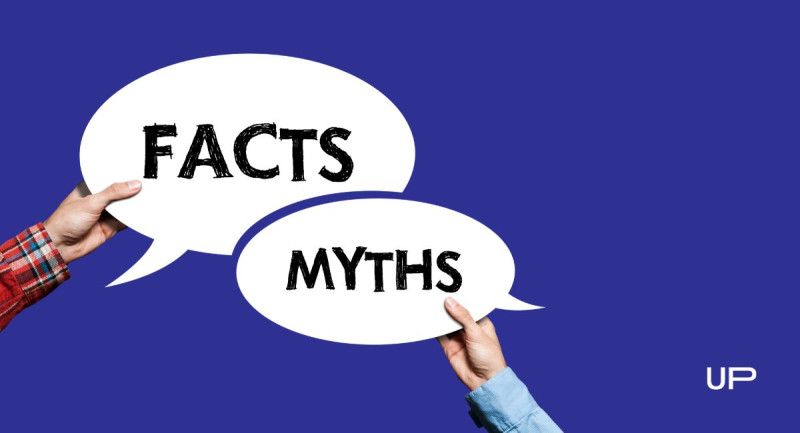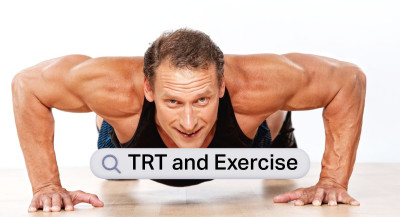TRT Myths Busted: 5 False Beliefs Holding Men Back


Despite growing awareness and improved access to testosterone replacement therapy (TRT) in Canada, many men over 40 still hesitate to take the first step. Why? It’s not lack of symptoms—low libido, energy dips, mood swings, and slower recovery are common at this age.

It’s the fear. Not of needles or clinics, but of the misinformation floating around online, at the gym, or in casual conversations. Myths about TRT causing permanent infertility, heart problems, or personality changes continue to spread, even though they don’t align with current medical evidence.
For Canadian men exploring hormone therapy, separating fact from fiction is essential.
This article breaks down five of the most persistent myths about TRT—and gives you the truth so you can make informed, confident decisions about your health.
Topics covered in this article:
- Myth #1: TRT Is Only for Bodybuilders
- Myth #2: TRT Will Make You Permanently Infertile
- Myth #3: You Can Never Stop TRT Once You Start
- Myth #4: TRT Causes Heart Attacks, Cancer, or Rage
- Myth #5: TRT Fixes Everything About Aging
- Conclusion – Get the Facts Before You Dismiss the Fix
- FAQs – Straight Answers for Men Over 40 in Canada
- References
Myth #1: TRT Is Only for Bodybuilders
One of the most common testosterone myths—especially in Canada—is that TRT is meant for competitive athletes, fitness influencers, or bodybuilders chasing massive gains. This couldn’t be further from the truth. Testosterone replacement therapy is a legitimate medical treatment designed to help men with clinically low testosterone levels (also called hypogonadism) regain normal hormonal function and improve quality of life.

Here’s the reality:
- TRT is prescribed to treat medical symptoms, not build exaggerated muscle mass. These symptoms include low libido, erectile dysfunction, chronic fatigue, irritability, and loss of muscle tone.
- The goal is restoration, not enhancement. TRT is used to bring testosterone levels back into a healthy, age-appropriate range—not to push them beyond natural limits.
- Canadian medical guidelines support TRT for men over 40 who have been diagnosed with low T through proper blood testing—not based on aesthetics or gym goals.
So if you’ve been holding back because you think TRT is “not for guys like you,” know this: it’s not about bodybuilding. It’s about getting back to feeling like yourself, with the energy, drive, and intimacy that may have quietly slipped away.
Myth #2: TRT Will Make You Permanently Infertile
It’s true that testosterone replacement therapy (TRT) can temporarily reduce sperm production—but the idea that it causes permanent infertility is a major misconception. Many men in Canada avoid TRT out of fear that it will eliminate their ability to have children down the line. The reality is far more nuanced—and hopeful.
Here’s what you need to know:
- TRT can suppress fertility, but it's usually reversible. When external testosterone is introduced, the body may slow or stop its own production of sperm. This is a known effect, but it doesn't mean it's permanent.
- Fertility often returns after stopping TRT. Research shows that most men recover sperm production within several months of discontinuing treatment—especially those who were fertile before starting.
- There are ways to preserve fertility during TRT. If maintaining fertility is a priority, doctors in Canada may prescribe medications like hCG (human chorionic gonadotropin) alongside TRT to help keep natural sperm production active.
In short, TRT does impact fertility—but not in the irreversible way many fear. If you're thinking about having kids now or in the future, talk openly with your healthcare provider. With proper planning and monitoring, it’s entirely possible to manage both hormone health and reproductive goals.
Myth #3: You Can Never Stop TRT Once You Start
One of the most intimidating beliefs about testosterone replacement therapy (TRT) is the idea that once you begin, you're locked in for life. This misconception keeps many men in Canada from even getting tested—worried they’ll be dependent forever. The truth? TRT can be adjusted, tapered, or even discontinued under medical supervision.
Here’s the real story:
- TRT doesn’t shut down your body permanently. While it does suppress natural testosterone production while in use, your body can restart production after stopping, especially if levels weren’t critically low to begin with.
- Tapering off is possible. You don’t have to quit cold turkey. With the help of a healthcare provider, men can gradually reduce TRT doses to allow the body to recalibrate its hormone signals.
- Some men stop TRT and feel fine. Others may choose to stay on it long term because they feel consistently better—but that’s a decision made with a doctor, not a biological trap.
In Canada, TRT is delivered through a controlled, monitored medical system—not black-market shortcuts or gym protocols. That means you’re in charge of your treatment plan, with support to pause, adjust, or stop when it makes sense for your health.
Myth #4: TRT Causes Heart Attacks, Cancer, or Rage
This myth has deep roots in outdated studies and media hype, but it’s also one of the most damaging. Many men over 40 in Canada avoid testosterone replacement therapy (TRT) because they’ve heard it causes heart attacks, fuels prostate cancer, or turns users into angry, aggressive “rage monsters.” Let’s set the record straight—modern research tells a very different story.

Here’s what the science actually shows:
- Heart health: While early studies like Vigen et al. (2013) raised alarms, newer meta-analyses involving tens of thousands of men have found no increased cardiovascular risk from TRT—and in some cases, even reduced heart-related events when testosterone is properly balanced and monitored.
👉 Study link – JAMA 2022 meta-analysis
- Prostate cancer: No credible evidence supports the idea that TRT causes prostate cancer. Canadian guidelines echo findings that normalizing low testosterone doesn’t increase cancer risk when screening is done regularly.
- “Roid rage”: That aggressive behaviour stereotype comes from abuse of anabolic steroids, not medically prescribed TRT. In fact, studies show balanced testosterone may reduce irritability and improve mood, especially in men with low T.
TRT is not a danger when used responsibly—it’s a regulated medical treatment. If you’re working with a licensed provider in Canada who monitors your heart health and prostate markers, the risks are very low and the benefits—when indicated—can be life-changing.
⚠️ What About Mental Health and TRT? A Closer Look
Some men worry that testosterone replacement therapy (TRT) could increase risks of depression or even suicidal thoughts. That concern largely stems from early studies and sensational headlines—but here's what up-to-date evidence shows:
- TRT may actually help mood in men with low testosterone, especially when symptoms include fatigue, apathy, or low motivation.
- A 2019 meta-analysis in JAMA Psychiatry found that TRT significantly reduced depressive symptoms in men with low T—especially those with mild or subthreshold depression.
- There’s no strong evidence linking medically supervised TRT to increased suicide risk in otherwise stable individuals.
That said, mental health should always be part of the conversation. If you have a history of depression or anxiety, speak openly with your doctor. TRT isn’t a cure-all—but when carefully prescribed, it’s not the emotional risk some fear.
Myth #5: TRT Fixes Everything About Aging
It’s easy to believe that testosterone replacement therapy (TRT) is a magic bullet—especially when it’s marketed as the answer to low energy, belly fat, flagging libido, and even foggy thinking. But here’s the truth: while TRT can make a big difference for men over 40 with low testosterone, it’s not a cure-all for aging.
Here’s what TRT can help with—when used correctly:
- Restoring sex drive and improving erections in men with clinically low testosterone
- Boosting energy and motivation, especially for those who feel chronically fatigued
- Supporting lean muscle retention and strength, particularly when paired with resistance training
- Lifting mood and reducing irritability in some men
But there are limits:
- TRT won’t reverse aging. It won’t give you the metabolism of a 25-year-old or erase lifestyle damage caused by poor diet, sleep, or inactivity.
- It won’t solve all mental health issues. Depression, anxiety, and brain fog may have hormonal roots—but they often need broader treatment plans.
- TRT is one piece of the puzzle. It works best alongside healthy habits like regular exercise, stress management, balanced nutrition, and sleep.
In short, testosterone therapy in Canada can be a powerful tool for men with low T—but expecting it to fix everything sets you up for disappointment. Think of TRT as a foundation, not a finish line. When combined with intentional lifestyle upgrades, it can help you thrive—not just survive—well into midlife and beyond.
Conclusion – Get the Facts Before You Dismiss the Fix
Testosterone replacement therapy (TRT) isn’t some underground secret for athletes or a risky shortcut for men chasing youth—it’s a medically recognized treatment for a real health condition: low testosterone. And yet, for many men over 40 in Canada, myths and misinformation continue to block the path to relief.

You don’t need to suffer in silence with low energy, fading libido, or mood swings just because you’re worried about outdated headlines or gym-bro stereotypes. The truth is, modern TRT—when prescribed responsibly and monitored closely—can safely restore balance and help you feel like yourself again.
Before you dismiss TRT out of fear, talk to a qualified provider. Get tested. Ask questions. And most importantly, base your decision on science—not stigma. Your health, vitality, and relationships are too important to be held back by myths.
FAQs – Straight Answers for Men Over 40 in Canada
No. Even moderate symptoms—like low sex drive, energy dips, poor sleep, or mood changes—can be signs of low testosterone. If blood tests confirm your levels are below normal, you may be a candidate for TRT in Canada.
Not necessarily. Some men choose to stay on TRT long-term because they feel better, but it’s possible to stop under medical supervision. Tapering off can allow your body to resume natural production if appropriate.
TRT can reduce sperm production temporarily, but it doesn’t cause permanent infertility in most cases. If fertility is a concern, doctors in Canada may recommend add-ons like hCG to help preserve it.
Recent, high-quality research shows that TRT is not linked to increased risk of heart attacks or prostate cancer when prescribed and monitored properly. Regular checkups help ensure it stays safe and effective.
Start with a consultation and blood test through a licensed clinic or physician. If your testosterone is low and symptoms match, you may receive a personalized TRT plan with ongoing monitoring to track results and safety.
References
UPGUYS has strict sourcing guidelines to ensure our content is accurate and current. We rely on peer-reviewed studies, academic research institutions, and medical associations. We strive to use primary sources and refrain from using tertiary references.- Testosterone Therapy is Associated With Depression, Suicidality, and Intentional Self-Harm: Analysis of a National Federated Database, PubMed,
https://pubmed.ncbi.nlm.nih.gov/35437187/ - Association of a Multisite Interprofessional Education Initiative With Quality of Primary Care, PubMed,
https://pubmed.ncbi.nlm.nih.gov/31747038/ - Association of Testosterone Treatment With Alleviation of Depressive Symptoms in Men: A Systematic Review and Meta-analysis, PubMed,
https://pubmed.ncbi.nlm.nih.gov/30427999/
This article is written for informational purposes only and does not constitute medical advice. The information provided in the articles cannot and should not replace advice from a healthcare professional. Talk to your healthcare provider about any physical or mental health concerns or the risks and benefits of any treatment or medication.





